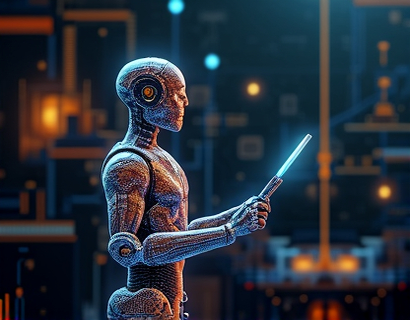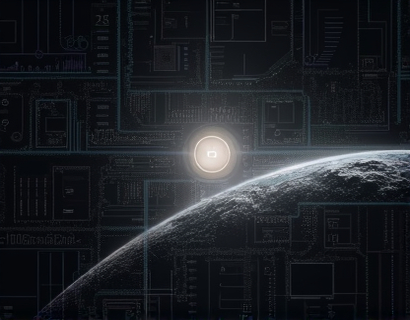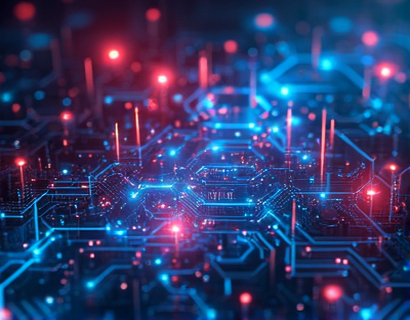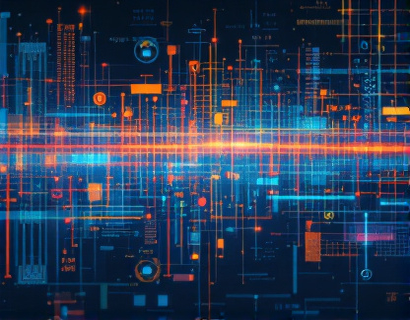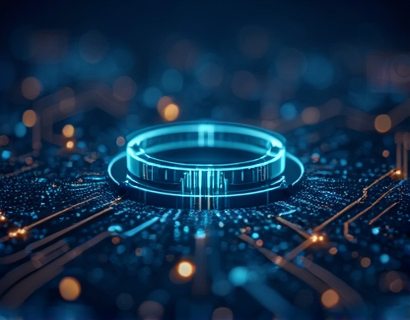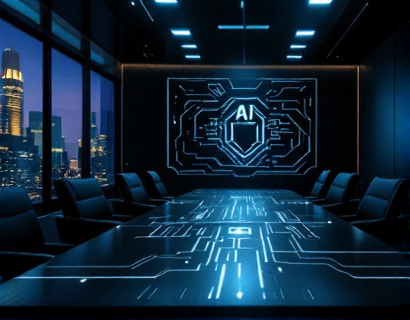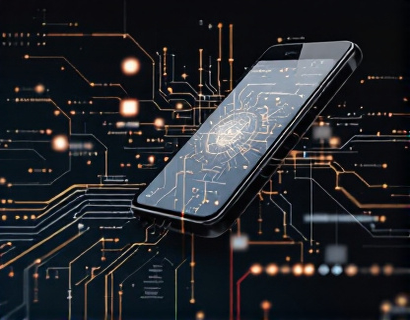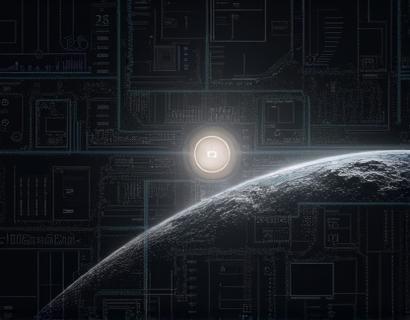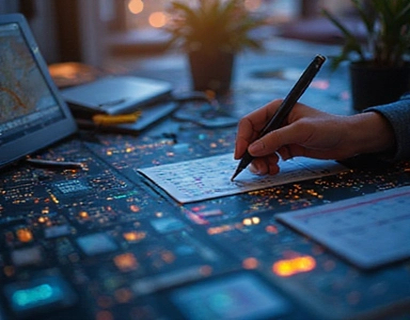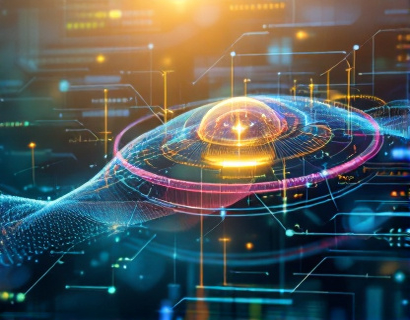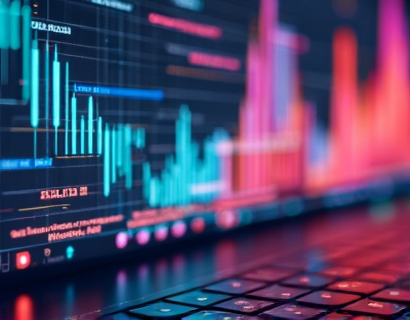Unlocking the Future: Leveraging AI and Crypto for Next-Gen Digital Transformation
The intersection of artificial intelligence and cryptocurrency is paving the way for a revolutionary digital transformation, one that promises to redefine how we interact with technology, enhance security, and streamline processes. This convergence of advanced algorithms and blockchain technology is not just a trend but a fundamental shift in the digital landscape. As we explore this synergy, it becomes evident that the potential for innovation is vast, offering solutions that are more efficient, secure, and user-friendly than ever before.
The integration of AI and crypto is transforming the way data is processed and secured. Traditional systems often struggle with scalability and security, but the combination of AI's computational prowess and blockchain's decentralized security model creates a powerful synergy. This partnership is leading to the development of smarter, more resilient systems that can adapt to changing demands and threats in real-time.
Enhanced Security Through AI and Crypto
One of the most significant benefits of merging AI and cryptocurrency is the enhancement of security measures. Blockchain's inherent security features, such as immutability and transparency, are bolstered by AI's ability to detect and respond to threats proactively. AI algorithms can analyze vast amounts of data to identify patterns and anomalies, enabling real-time monitoring and automated responses to potential security breaches.
For instance, machine learning models can be trained to recognize suspicious activities on a blockchain network, such as unusual transaction patterns or unauthorized access attempts. These models can continuously learn and adapt, improving their accuracy over time. This proactive approach to security not only protects sensitive information but also builds trust among users, a critical factor in the adoption of new technologies.
Smart Contracts and Automated Processes
Smart contracts, self-executing contracts with the terms directly written into code, are another area where AI and crypto intersect to drive digital transformation. These contracts automatically enforce and execute agreements when predefined conditions are met, eliminating the need for intermediaries and reducing transaction costs and times.
AI can further optimize smart contracts by analyzing data to predict outcomes and suggest improvements. For example, AI can help in drafting more efficient smart contract code by identifying redundant or unnecessary clauses, thus enhancing the overall performance and reliability of these contracts. This synergy ensures that processes are not only secure but also streamlined, reducing friction and increasing efficiency.
Personalized User Experiences
The combination of AI and crypto is also revolutionizing how we deliver personalized user experiences. AI-driven analytics can process vast amounts of user data to understand preferences, behaviors, and needs, allowing for highly tailored interactions. In the context of cryptocurrency, this means creating more intuitive and user-friendly interfaces for wallet management, trading, and other financial activities.
Moreover, the use of non-custodial wallets, powered by AI and blockchain, allows users to have full control over their assets without relying on third-party services. AI can enhance these wallets by providing real-time insights, alerts, and recommendations, making the user experience seamless and secure. This level of personalization not only improves user satisfaction but also fosters greater adoption of crypto-based solutions.
Decentralized Finance (DeFi) and AI
Decentralized Finance, or DeFi, is a prime example of how AI and crypto are transforming the financial sector. DeFi platforms leverage blockchain technology to offer traditional financial services in a decentralized manner, removing the need for intermediaries like banks. AI plays a crucial role in enhancing the functionality and accessibility of these platforms.
AI algorithms can analyze market data to predict trends, optimize trading strategies, and manage risks. For instance, AI-driven bots can execute trades based on predefined criteria, adapting to market conditions in real-time. This not only increases the efficiency of trading but also opens up financial opportunities to a broader audience, including those in underserved regions.
Additionally, AI can help in identifying and mitigating fraud in DeFi protocols by analyzing transaction patterns and detecting anomalies. This ensures that the decentralized ecosystem remains secure and trustworthy, encouraging more users to participate in DeFi activities.
Supply Chain Optimization
Beyond finance, the integration of AI and crypto is also transforming supply chain management. Blockchain provides a transparent and immutable ledger for tracking goods from production to delivery, while AI enhances this process by analyzing data to optimize logistics and inventory management.
AI can predict demand fluctuations, optimize routing, and reduce waste by providing real-time insights into the supply chain. For example, machine learning models can forecast inventory levels based on historical data and current trends, ensuring that stock is neither overstocked nor understocked. This not only improves efficiency but also reduces costs and environmental impact.
Furthermore, the use of smart contracts in supply chain management can automate payments and ensure compliance with contractual obligations. AI can monitor the performance of each step in the supply chain, triggering smart contracts to release payments once conditions are met. This automation reduces delays and disputes, creating a more seamless and reliable supply chain.
Healthcare Innovations
The healthcare sector is another area where the combination of AI and crypto is driving significant innovation. Blockchain can secure patient data, ensuring privacy and compliance with regulations like GDPR. AI, on the other hand, can analyze this data to provide insights for better diagnosis, treatment, and patient care.
For instance, AI-powered diagnostic tools can analyze medical images and patient histories to identify potential health issues early and accurately. These tools can be integrated with blockchain to ensure that patient data is securely shared among healthcare providers, facilitating coordinated care and improving outcomes.
Additionally, AI can help in managing clinical trials by optimizing participant recruitment, monitoring data integrity, and predicting trial outcomes. Smart contracts can automate the payment of incentives to participants and ensure that trial data is tamper-proof. This not only accelerates the research process but also enhances the reliability and trustworthiness of clinical trials.
Challenges and Considerations
While the potential of AI and crypto in digital transformation is immense, there are several challenges and considerations that must be addressed. One of the primary concerns is the regulatory landscape. As these technologies evolve, governments and regulatory bodies are still grappling with how to govern them effectively. Ensuring compliance while fostering innovation requires a balanced approach that protects consumers and maintains market integrity.
Another challenge is the technical complexity involved in integrating AI and blockchain systems. Developing robust and scalable solutions requires expertise in both domains, which can be a barrier for many organizations. Education and collaboration between tech experts, policymakers, and industry stakeholders are essential to overcome these hurdles.
Furthermore, the environmental impact of blockchain, particularly proof-of-work systems, is a significant concern. The high energy consumption associated with mining can be mitigated by adopting more sustainable consensus mechanisms, such as proof-of-stake. AI can play a role here by optimizing energy usage and identifying more efficient protocols.
Future Prospects
Looking ahead, the convergence of AI and crypto holds even greater promise. As these technologies continue to mature, we can expect to see more sophisticated applications that further enhance digital interactions. The development of interoperable blockchain networks, powered by AI, will enable seamless communication and data exchange across different platforms, fostering a more connected and efficient digital ecosystem.
Moreover, the integration of AI with emerging technologies like the Internet of Things (IoT) and 5G will create new opportunities for real-time data processing and decision-making. This synergy will drive innovations in areas such as smart cities, autonomous vehicles, and personalized healthcare, making our lives more convenient, safe, and connected.
In conclusion, the fusion of AI and cryptocurrency is not just a technological advancement but a transformative force that is reshaping the digital landscape. By leveraging the strengths of both domains, we can create more secure, efficient, and user-friendly systems that enhance connectivity and innovation. As we move forward, embracing this synergy will be crucial for staying ahead in the rapidly evolving tech world.






